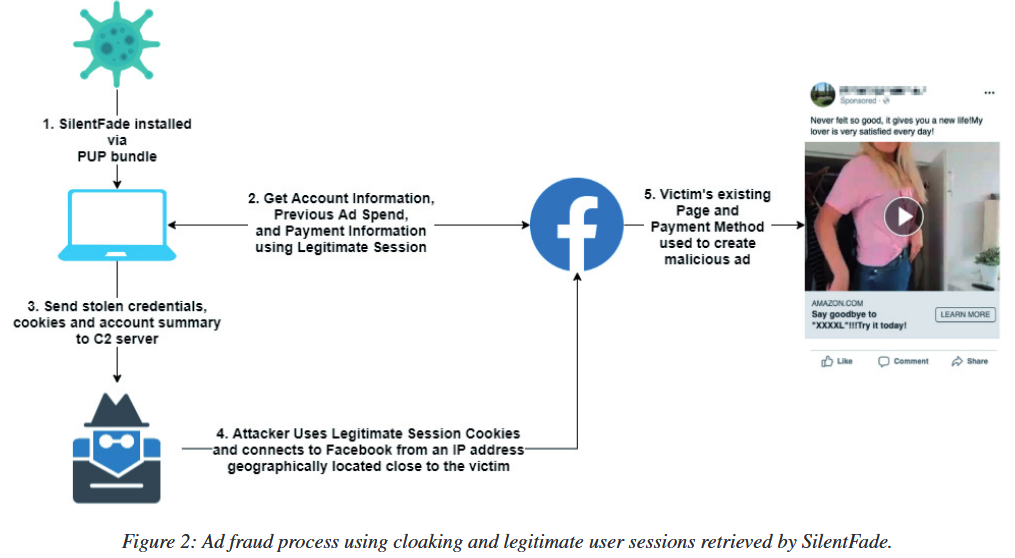At the Virus Bulletin 2020 conferencia, Facebook’s security team revealed one of the most complex malware operations it has ever faced. Information security experts told about the Chinese hack group SilentFade, which defrauded Facebook users for more than 4 Millón de dólares.
The main target of these hackers, as you might guess, were Facebook users. The attackers used Windows Trojans, browser injection, secuencias de comandos, and even vulnerabilities in the Facebook platform for their campaigns.
It is not surprising, considering that Facebook actually has bugs, por ejemplo, I recently talked about Vulnerability in OAuth Protocol that Allows Hacking Any Facebook Account.
los piratas informáticos’ task was to infect users with a Trojan, take control of their browsers, and steal passwords and cookies to gain access to the victims’ social network accounts.
En primer lugar, the hackers were interested in the accounts to which were linked any possible payment method. On behalf of such accounts, SilentFade bought ads on Facebook, por supuesto, using the victim’s funds.

Although the group’s activity lasted only a few months, according to Facebook, during this time the fraudsters managed to earn more than 4,000,000 US dollars, all this sum was used to place malicious ads.
Such ads, como una regla, were limited to the geographic region of the infected user (in order to limit their availability and not attract too much attention), and all were built according to the same template. Por ejemplo, hackers used short URLs and celebrity images to lure users into various fraudulent sites selling controversial products, including weight loss aids, keto pills, y más.
The investigation made it possible to identify the malware used by cybercriminals, strains of the group’s malware, as well as campaigns dating back to 2016. Al final, all this helped to associate suspicious activity with a specific Chinese company and two developers.
Según facebook, SilentFade began operations in 2016, when was developed a malware called SuperCPA, primarily targeting Chinese users.
«Not much is known about this malware because it was controlled by downloadable configuration files, but we believe it was used for click fraud (CPA stands for Cost Per Action in this case)», — the experts said.
The researchers reported that the attackers distributed SilentFade in conjunction with legitimate software that they posted for download on the Internet. Por ejemplo, one day Facebook experts stumbled upon an announcement from the SilentFade developers published on hacker forums. The scammers wrote that they were ready to buy traffic from hacked sites and other sources, and after the purchase they redirected it to pages hosting various software infected with SilentFade.
If a user fell for a scammer’s trick and malware entered the system, the SilentFade Trojan gained control over the victim’s computer and replaced the legitimate DLL files of the browser with malicious versions, cual, en esencia, allowed SilentFade operators to control the victim’s browser. De este modo, the malware is able to successfully attack Chrome, Firefox, explorador de Internet, Ópera, Borde, órbita, amigo, Touch, Kometa and Yandex Browser.
These malicious DLLs were then used to steal credentials stored in the browser as well as cookies. The hackers used the Facebook session cookies to gain access to the victim’s account, y como un resultado, they did not need to provide credentials or a 2FA token.
Once access to the user’s account was obtained, the malware used scripts to disable the social network’s security mechanisms. Investigating what is happening, Facebook experts discovered vulnerability on its own platform, due to which users could not re-enable the deactivated security features.
So that users do not know that someone has compromised their account and is placing ads on their behalf, SilentFade operators used control over the victim’s browser to access the Facebook settings section and disabled:
- site notifications;
- chat notification sounds;
- SMS notifications;
- any email notifications;
- page related notifications.
Al mismo tiempo, the attackers understood that Facebook’s security systems could still detect suspicious activity and logins, and inform users about this via private messages. Por lo tanto, hackers additionally blocked the Facebook for usiness and Facebook Login Alerts accounts, from which such warnings could come.
The mentioned Facebook bug was abused by hackers every time the user tried to unblock these accounts, provoking the error and preventing the victim from getting rid of these bans.
“This is the first time we’ve seen malware actively altering notification settings, blocking pages, and exploiting a bug in the blocking subsystem to secure a foothold in a compromised account. Sin embargo, the exploitation of the notification bug was even a positive development. This allowed us to identify compromised accounts, assess the scale of SilentFade infections and correlate this data with user account abuse, linking it to the malware responsible for the initial compromise of the accounts”, — said the researchers.
Como resultado, en 2019, Facebook engineers eliminated the found bug, canceled all malware actions to block notifications, and compensated the damage to users whose accounts were used to buy malicious ads.
But the company’s specialists did not stop there: throughout 2019, they tracked the malware itself and its creators all over the Internet. Así que, they managed to find an account on GitHub that hosted many libraries that were clearly used to develop SilentFade.
This account was linked by experts to the Hong Kong-based development company ILikeAd Media International Company Ltd., established in 2016.
Como resultado, en diciembre 2019, Facebook filed a lawsuit against this company, and the proceedings are still ongoing.
en su informe, Facebook experts emphasized that SilentFade is only part of a major trend among cybercriminals. It turned out that many hackers living in China are increasingly targeting the social network and its 2,000,000,000 usuarios. Específicamente, Facebook is attacked by such malware as Scranos, FacebookRobot y StressPaint.

